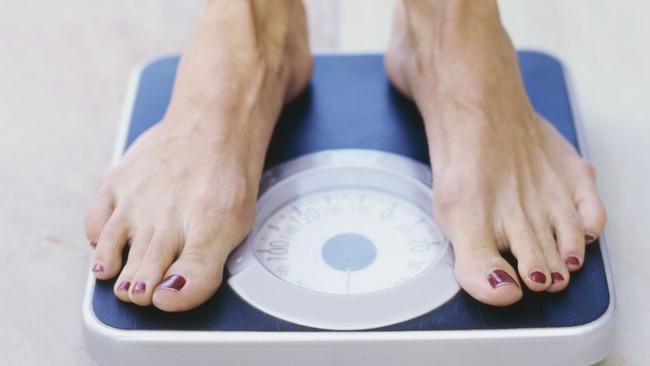What do the numbers on the scale really mean?
STEPPING in the scales can be either nerve-racking or motivating. But is it really a useful measurement? What do those numbers actually tell us?

YOU wake up and step on the scales. Now, we all know far too well how this story can end. You’re either up a kilo, or down by 30 grams. Worse, the scale didn’t even budge. Love it or loathe it — the question is: to weigh or not to weigh?
Stepping on the scale for your regular weigh-in can be nerve-racking or motivating, depending on the outcome. Proponents of regular weigh ins say it can be a powerful tool.
And according to the latest research published in the Journal of Obesity if you want to lose weight or prevent the kilo creep, weighing yourself regularly could be crucial for long-term weight control.
But the definition of ‘regular’ is very broad and opinions vary about how often should you weigh yourself. Some experts warn that being a slave to the scale could be confusing, discouraging or even psychologically devastating, partly due to issues surrounding disordered eating behaviours.
In other words, a bad moment at the scale can turn into bingeing on unlimited chocolates and potato chips and lack of self worth.
And in fact, that’s how most women feel. A recent study found that women who weigh themselves frequently are more likely to have more negative body image, lower self-esteem, and higher likelihood of depression.
NOT THE WHOLE STORY
Like all pieces of data, the number on the scale may or may not be an accurate reflection of whether or not you are losing body fat. The scale reading is only a number, which tells you your relationship with gravity and not all that much about your health.
And here’s the best part: no one else will ever know what that number is unless you tell them.
More importantly, weight fluctuates day to day, hour to hour. So despite the fact you’re eating well and exercising regularly, which may impact how your clothes fit — the quality of your skin, and your energy levels — the scale may not reflect this.
Why? Maybe you are ovulating or constipated. Maybe you are retaining water because you’ve lathered soy sauce over your sushi which had enough sodium for an entire week.
Maybe you’re stressed to the eye balls which sent your cortisol levels soaring and in turn abruptly halted any weight loss success.
Regardless of what it is, there are more things affecting your weight that you can’t control than things you can control.
What’s more, the body mass index (BMI) is a notoriously unreliable metric used to determine whether you are in a healthy weight range for your height. In other words, it doesn’t differentiate between fat and lean tissue (i.e. muscle) and is only useful when looking for statistical trends in populations — it’s certainly not intended for determining the health of individuals.
BOTTOM LINE
Agree, sometimes you just want to know what your number is — a bit like checking a bank balance. And that’s totally OK.
However, it’s way more important to pay attention to one’s health habits than one’s weight. Do you eat well? Do you exercise regularly? How are your moods and energy tracking?
These factors have a far more direct effect on health, than one infamous number which is sometimes nothing more than a distraction.
So whether you’re a frequent user of the scale or stepping on for the first time in months, be sure to keep the following in mind to avoid misleading numbers:
Consistency is key: Try to step on the scale the same day of the week, around the same time of day, and wearing about the same amount of clothing every time.
Always use the same scale: All scales are calibrated differently.
Keep a well-rounded view: Combine scale figures with alternate measurements such as waist circumference. This is the most powerful piece of accompanying data useful at determining overall direction of fat loss. Ideal waistline scenario is less than 94cm for males and less than 80cm for females.
Kathleen Alleaume is a nutrition and exercise scientist and author of What’s Eating You?




